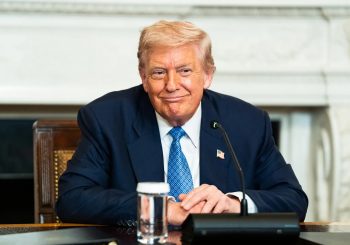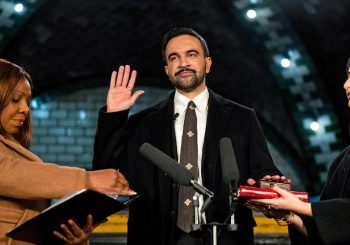United States President Donald Trump has appeared to backtrack from previous committments in support of Israeli settlements just days before his meeting with Israeli Prime Minister Benjamin Netanyahu in Washington DC.
Following his vigorous support to Israel during his presidential campaign and his numerous promises that the US will be a loyal ally, Trump said that he doesn’t believe the settlement growth is “good for peace” between Palestine and Israel. The comments came just one week after he said that the settlements are not an impediment to peace.
Moreover, in December 2016, Trump strongly condemned a move by the Obama administration to not veto a resolution reaffirming the illegality of Israeli settlements beyond the internationally recognized 1967 borders. Trump took to Twitter at the time promising that the US would be a loyal ally to Israel.
Earlier this month, the Knesset passed a legislation that legalizes about 4,000 settler homes, a move that was welcomed by Israel’s right-wing but criticized by the left-wing. This legislation was the first of its kind in Area C of the West Bank that is under Israeli military, a step that is depicted as a de facto annexation.
Will Trump Really Move the Embassy to Israel?
The backtracking has also raised questions about whether Trump is serious about moving the US Embassy from Tel Aviv to East Jerusalem; a move that has prompted outcry among the international community who believe it would severely harm chances of a two-state solution.
In an interview with Israel Hayom, an Israeli news outlet acting as the mouthpiece for Israel’s prime minister, Trump said that he is still thinking seriously of moving the embassy to Jerusalem. Trump said the move “may not be easy”.
Political Analyst Tarek Fahmy told Egyptian Streets that moving the embassy to Jerusalem was an inevitable move, however, what Trump announced over the past few days should not be taken out of context.
“People expected that Trump will take the decision of moving the embassy to Jerusalem once he takes office,” said Fahmy.
“However, the US ambassador to Israel David Friedman is currently staying and doing his job from Jerusalem and the city already has about three consulates and diplomatic offices which is a hint that should not be ignored.”
Fahmy excluded the possibility of Trump using the embassy as a card to pressure the Palestinian leadership to get back to negotiations with Israel. He further added that he expects Jared Kushner, Trump’s senior adviser, to take part in the negotiations, but as a real estate developer he will need more time to make an appearance in the arena.
“The upcoming meeting between Trump and Netanyahu will settle a lot of mutual topics and they will discuss the US aid program to Israel that the latter is aiming to double up. They will also discuss the military aid and the Iranian topic which is of a major importance to Israel,” said Fahmy, adding that he believes Trump will provide Israel with the support it generally cares about.
For example, on Friday, the US blocked the appointment of former Palestinian prime minister Salam Fayyad as the UN envoy to Libya. Israeli envoy to the UN Danny Danon said, “This is the beginning of a new era at the UN, the US is backing and firmly siding with Israel.” Meanwhile, the US made it clear that it blocked the appointment purely on the basis that Fayyad is Palestinian.
Fahmy concluded by saying he doesn’t think that Trump will take steps to deter Israel from its settlement activity. Regarding Kushner and Palestinian-Israeli negotiations, they will all start following the meeting of Trump and Netanyahu.
The US generally doesn’t defy Israel’s policies. However, former US Secretary of State John Kerry delivered a speech that took the US-Middle East diplomacy on a different path. Kerry publicly criticized the Israeli settlements and pointed out that they hinder the two-state solution. Kerry further added that current Israeli government’s policies are leading to a one-state solution and the expansion of their settlements is accelerating.
The long-debated two-state solution was almost finalized in 1974, when 18 states from Latin America filed a resolution in the UN that demanded the termination of state of war, and Israel’s withdrawal from all the territories it occupied in 1967. However, the resolution didn’t pass back then because the Arab countries severely criticized it.
During an interview, Egypt’s Former Vice President for Foreign Affairs Mohamed ElBaradei said that once the 1974 resolution failed to pass, Arab and African countries started applauding in the UN. Currently, Egypt, along with several other Arab and European countries are pushing Palestine and Israel to get back to negotiations and deeply consider the two-state solution.







Comments (0)